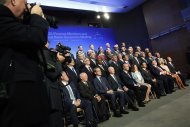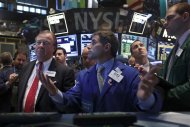
Top officials for the world's biggest economic powers get nostalgic
over how they mobilized to save the world from economic collapse in
2008. They are not nearly so glowing about their current muddle.
At meetings held in Washington last week, there was a sense that the
Group of 20, which brings together policymakers who oversee the vast
majority of global output, has grown bogged down by a sprawling agenda
no longer focused by crisis.
"It's very difficult to coordinate and to come up with meaningful
results," said Ksenia Yudaeva, a deputy central bank governor for
Russia, which organized this year's G20 meetings.
"Every step in right direction gets smaller and smaller."
Gone are the heady days of 2008 and 2009 when leaders at G20 summits
hashed out major deals on fiscal stimulus and trade policy to counter a
global financial crisis that threatened worldwide depression. In 2010
and 2011, the group was a forum for prodding European officials to come
up with a plan to keep the euro zone from breaking up.
Since then, the list of issues on the G20 agenda has ballooned. It
now includes everything from climate change and food security to youth
unemployment, as if the body were a mini United Nations.
"What's happened is that the objective of the G20 has become
confused," said Martin Parkinson, Australia's treasury secretary. He
said the body needs to focus more squarely on its core mission of making
the global economy stronger and more stable.
Some of the challenges before the group are so great they will not be resolved anytime soon.
The world's economy remains dangerously unbalanced, economists and
officials agree, with countries like China relying too heavily on
exports and others like the United States depending too much on imports.
This leads to uncontrollable capital flows that can inflate dangerous
bubbles.
Policymakers are still dealing with the wreckage of a burst debt
bubble that cratered the U.S. housing market. They worry that super-low
interest rates used to fight recession in advanced economies may have
created new bubbles around the world.
MISSION CREEP
While the G20 meetings on Thursday and Friday were dominated by
concerns about a political crisis in Washington that could trigger a
U.S. debt default, officials also spent time trying to figure out how
they might get their mojo back.
Finance ministers and central bankers tried to make their common
statement as short as possible and also held meetings on how to trim the
number of issues the forum should address.
Australia, which will host G20 meetings next year, hopes to put a
brake on some of the mission creep. Parkinson said he hopes to focus
next year on tying up loose ends, such as implementing new financial
regulations leaders have already agreed to undertake.
"If we really want to have success at a G20, then we have got to have discipline over what we put on (the agenda)," he said.
Part of the problem is that the G20 came into its own during the greatest financial panic since the Great Depression.
Emergencies have a way of focusing leaders' attention and agendas.
Now that the world economy is recovering, it's harder to reach deals or
even agree on what needs fixing first.
"We have drifted a bit," said Canadian Finance Minister Jim Flaherty.
Another reason the G20 agenda has become unwieldy is simply the size of the forum.
With so many players at the table, representing disparate economic
and political systems ranging from Western, free-market democracies to
the likes of China, with a command economy dominated by the state,
agreeing on a tight, common-interest agenda is a taxing proposition.
"Each country gets one thing added to the agenda. Next thing you
know you have an encyclopedia that comes out of the leaders'
statements," said Faryar Shirzad, global head of government affairs at
Goldman Sachs.
The G20 includes Argentina, Australia, Brazil, Canada, China,
France, Germany, India, Indonesia, Italy, Japan, the Republic of Korea,
Mexico, Russia, Saudi Arabia, South Africa, Turkey, the United Kingdom,
the United States and the European Union.
The membership list is unlikely to be trimmed anytime soon, however.
Previous economic forums were dominated by rich nations that no longer
account for the majority of global economic growth, and a primary
rationale for the group's formation was to foster more cooperation among
advanced and emerging economies.
"There isn't another forum that would get us all at the table," said British Finance Minister George Osborne.
Leaders want to have that table ready if they need to spring to action once again.
"If there's a real crisis ... I think that's very important that we're all intimate," Osborne said.

 Malaysia
Malaysia
































 Cameroon goalkeeper Charles Itandje made several
sparkling saves to help his side force a 0-0 draw in Tunisia on Sunday
in the first leg of their World Cup playoff.
Cameroon goalkeeper Charles Itandje made several
sparkling saves to help his side force a 0-0 draw in Tunisia on Sunday
in the first leg of their World Cup playoff.

 Top officials for the world's biggest economic powers get nostalgic
over how they mobilized to save the world from economic collapse in
2008. They are not nearly so glowing about their current muddle.
Top officials for the world's biggest economic powers get nostalgic
over how they mobilized to save the world from economic collapse in
2008. They are not nearly so glowing about their current muddle.
 Asian shares and U.S. stock index futures fell while the safe-haven
yen rose on Monday as a possible U.S. debt default crept closer after
weekend talks in Washington failed -- though markets appear still to
expect that a last-minute compromise will be reached.
Asian shares and U.S. stock index futures fell while the safe-haven
yen rose on Monday as a possible U.S. debt default crept closer after
weekend talks in Washington failed -- though markets appear still to
expect that a last-minute compromise will be reached.


